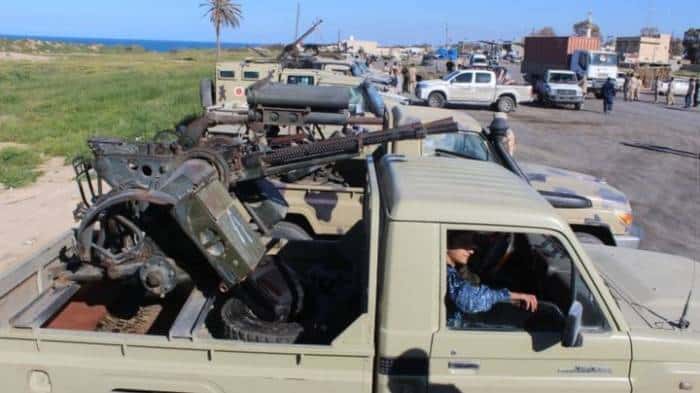“The West” is much divided over what should happen in Libya. This is particularly true for France and Italy, who each have vast oil and gas economic interests and are increasingly at odds with one another.
While admittedly the US and UK have an eye on their potential economic interests in a future Libya, theirs is more of an anti-terrorism focus aimed at eradicating ISIS’s presence in Libya and specifically to find ISIS leader Abu Bakr al-Baghdadi who is thought to have recently moved to Libya and set up his new HQ.
ISIS released a few weeks ago an 18 minute video (which TV stations around the world only had access to a few minutes) of him speaking, thought to have been taped in Libya, the first such video showing al-Baghdadi, providing proof of life, to be released in five years.
In the intervening current period, the battle to take Tripoli continues by Field Marshall Khalifa Haftar’s forces.
Also in almost tandem with the US/UK concentration on finding extremist terrorists in Libya (and elsewhere of course), views on the Muslim Brotherhood are being re-evaluated.
The East Libyan parliament has recently labelled the Muslim Brotherhood a terrorist group, while Washington is also contemplating the designation of the Brotherhood as a terrorist organization. This would also impact on their affiliated organisation Council on American Islamic Relations (CAIR) based in the US.
London has a more close economic relationship with Qatar – one of two Muslim Brotherhood governments in the world, the other being Turkey – so the UK has a degree of reluctance to upset the Qataris; evaluation of their position on the Brotherhood in London is on-going.
The London based pan-Arab daily Asharq al-Awsat reported on Tuesday 14th May that Haftar accused the Muslim Brotherhood governments of both Turkey and Qatar of supporting extremist militias, that include ISIS, and Haftar stated further, that notably Turkey has been supplying “heavy” arms, shipped regularly to Misrata.
A factor in the shift in Haftar’s fortunes was the fact he received a telephone call of support, on Monday 15th April, from President Trump, despite the fact that that call instigated widespread criticism from the “international community’s” main stream media (MSM).
Could it be President Trump wants Haftar to capture or kill al-Baghdadi, A man compared to Bin Laden?
The consequence of Trump’s emboldening Haftar actually also creates the potential environment for a relatively bloodless take-over of Tripoli.
The critical question is how long will it take Haftar to secure Tripoli – will there be a long military stand-off between the two sides?
In a Bloomberg piece, it said of the phone call, “President Trump indicated in a call to Libyan strongman Haftar (on 15th April) that the US supported an assault on the country’s capital to depose its United Nations-backed government, according to American officials familiar with the matter.” It continues, “the revelation that the US President had tacitly recognised Haftar and addressed him as ‘Field Marshal’ in the statement, as a Libyan leader, abruptly undermined the country’s internationally-recognized government led by Prime Minister Fayez Al-Sarraj.”
The response to that is to point out the fact that Serraj has zero legitimacy and zero credibility with the Libyan people. He is merely an unelected “Patsy” for the UN and “international community.”
The Bloomberg piece added, “Trump also spoke with Abu Dhabi Crown Prince Mohammed bin Zayed Al Nahyan, a Haftar supporter, the day before the White House issued the statement acknowledging the call with Haftar.”
A Guardian piece stated, “…support for Haftar’s offensive directly contradicts a formal statement a few days earlier from the Secretary of State, Mike Pompeo.”
All that confirms to us is something we already know: that America has little consensus amongst its political establishment on what should be their foreign policy in any country, not just Libya.
Looking ahead, what might be the potential best outcome for Libya and Libyans in the immediate future?
One might be Serraj’s resignation as Prime Minister – something France’s Macron suggested to him this month. The Brotherhood’s hold over him, not wishing to lose their ‘puppet,’ makes this unlikely unless of course the “International community” forces Serraj out. Another potential resolution would be for the selection by consensus of a new Prime Minister endorsed by his outgoing predecessor (Serraj) and, this being the most critical part, a man that Haftar accepts to actually be the new PM.
Neither Serraj or Haftar seem to want this now, resulting in effectively a political and military stalemate between the two sides, with the losers being the Libyan people.
It should be pointed out that Haftar, at 75 years of age, and in rather poor health, is thought to not have ambitions to be a dictator. He would like to continue to be a powerful player in Libyan affairs for the rest of his life. He appears to want to go down in history as the man who “saved his country” – not an unusual desired legacy for a soldier.
A few more important Libya facts not usually written about by the MSM:
The hope is that the end of Libya’s “slow burning” simmering civil war is finally in its last stages.
The fact is the moral support given to Haftar by Trump’s call to him was important and significant and could prove to yet tip the balance of power in the civil war in Haftar’s favour.
That said the realistic sombre assessment of the situation leads one to conclude that the “impasse” could, on the other hand, last months unless the intransigence of one or both of these two men, Serraj and Haftar, is broken.


